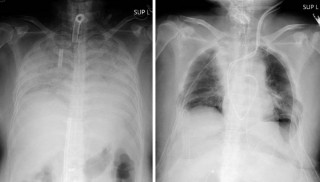Loading
Search
▼ In World First, COVID-19 Patient In Japan Undergoes Living Donor Lung Transplant
- Category:Other
Kyoto University Hospital said Thursday it had performed the world’s first living donor lung transplant on a patient who lost the functionality of both her lungs due to COVID-19.
The operation, which took around 11 hours to perform, transplanted part of healthy lungs from the patient’s husband and son to replace her failing lungs. Both donors are in stable condition, and the patient, who is currently in intensive care, is expected to be discharged in two months if all goes well, the hospital said.
According to the hospital, while dozens of lung transplants to treat damage after COVID-19 infection have been performed using organs from brain-dead donors in China, the United States and Europe, the waiting period for patients can be as long as two and a half years in Japan, where there are few such donors.
After it was determined that the woman in this case had no hope of recovery and that only a lung transplant could save her life, her husband and son offered to donate part of their lungs. The surgery went ahead after both acknowledged the risk of decreased lung capacity on their part.
There are usually restrictions on who can undergo such transplants based on age and physical condition. Use of such operations would be limited in the case of damage from COVID-19, which tend to cause more severe symptoms in older people and those with underlying illnesses.
But Professor Hiroshi Date, the thoracic surgeon who was in charge of the operation, said, “I think there is a lot of hope for this treatment in the sense that it creates a new option.”
The woman’s husband and son have expressed gratitude and joy over the successful lung transplant, the hospital said.
The woman, who lives in western Japan, had no pre-existing medical conditions but her respiratory function deteriorated rapidly after she was infected with the coronavirus that causes COVID-19 at the end of last year. She developed pneumonia, which caused both of her lungs to harden and shrink, destroying most of their functionality.
With at least two months having passed since she received a negative result in a polymerase chain reaction (PCR) test for the virus, the hospital considered the infection risk to medical staff to have decreased sufficiently to operate.
The woman was admitted to the hospital on Monday while connected to an artificial heart-lung device known as extracorporeal membrane oxygenation (ECMO), and underwent a transplant of part of her husband’s left lung and part of her son’s right lung two days later.
- April 9, 2021
- Comment (0)
- Trackback(0)


